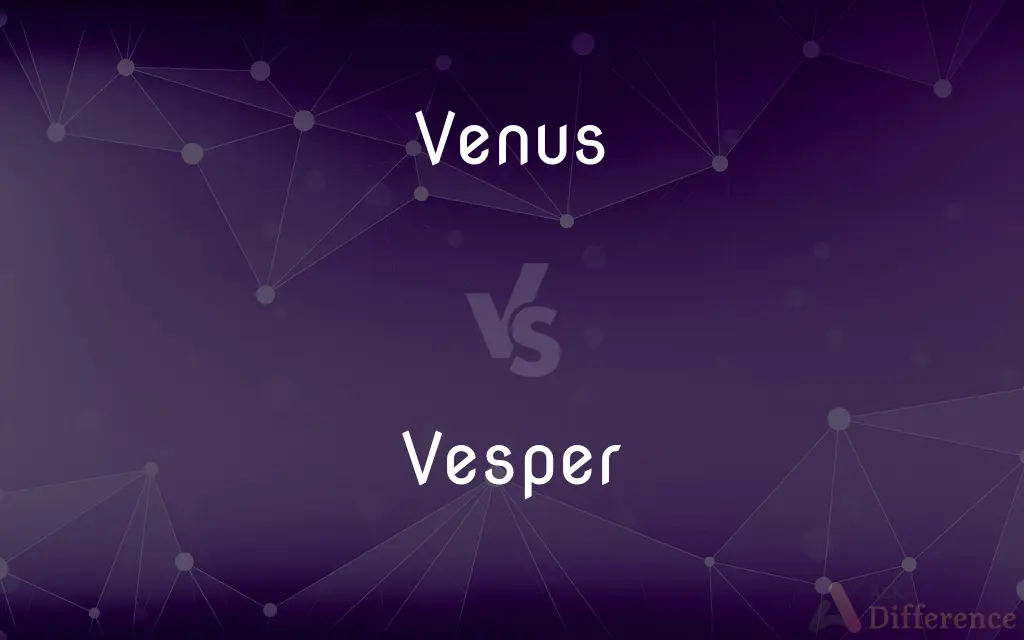Venus vs. Vesper — What's the Difference?
By Fiza Rafique & Urooj Arif — Updated on May 3, 2024
Venus is primarily known as the second planet from the Sun and a Roman goddess of love, whereas Vesper refers to the evening star and a liturgical evening prayer.

Difference Between Venus and Vesper
Table of Contents
ADVERTISEMENT
Key Differences
Venus is the name given to the second planet in our solar system, recognized for its bright, visible presence in the sky. On the other hand, Vesper, often synonymous with the "evening star," refers specifically to the appearance of planets like Venus when seen in the evening sky.
In Roman mythology, Venus is revered as the goddess of love, beauty, and fertility, embodying romantic and physical attractions. Whereas, Vesper in religious contexts signifies the evening prayers in the Christian liturgy, part of the canonical hours.
Astronomically, Venus can be seen both at dawn and dusk, leading it to be sometimes called the morning star as well as the evening star. Vesper, however, is traditionally associated only with the evening, marking the transition from day to night.
Venus, in its celestial role, exhibits phases like the Moon, which can be observed from Earth with a telescope, showing a dynamic and changing appearance. In contrast, Vesper as a concept remains largely symbolic, representing the consistent practice of evening prayer without such physical manifestations.
Culturally, Venus has inspired countless artworks, literature, and myths, highlighted by its significant impact on various cultures as a symbol of beauty and love. Conversely, Vesper, though less prominent culturally, holds a critical place in Christian religious practices and the routine of prayer.
ADVERTISEMENT
Comparison Chart
Definition
Second planet from the Sun
Evening star or evening prayer
Cultural Significance
Goddess of love in Roman mythology
Part of Christian liturgical hours
Visibility
Visible at dawn and dusk
Traditionally visible in the evening
Symbolism
Beauty, love, fertility
Evening, transition to night
Physical Observation
Shows phases like the Moon
No physical form; symbolic
Compare with Definitions
Venus
A planet second in order from the Sun.
Through a telescope, Venus appears quite bright in the night sky.
Vesper
Symbolic of evening or sunset.
The vesper light brings a calm end to the hustle of the day.
Venus
Roman goddess of love and beauty.
Many artists have depicted Venus in their sculptures and paintings.
Vesper
Part of the liturgical day in Christian traditions.
The monks prepare for vesper to complete their daily devotions.
Venus
Symbol of feminine beauty and attraction.
The term Venus often connotes idealized beauty and charm.
Vesper
The evening star, especially in poetic or literary contexts.
The poet referred to the twilight with the vesper shining above.
Venus
An object or figure representing perfection or beauty.
That sculpture is considered the Venus of its collection.
Vesper
Evening prayers in the Christian church.
The congregation gathers for vesper services at dusk.
Venus
A surface feature on Venus (planet).
The Magellan spacecraft mapped the surface features of Venus extensively.
Vesper
A time of day associated with evening prayers.
At vesper, the city seems to slow down and reflect.
Venus
Venus is the second planet from the Sun. It is named after the Roman goddess of love and beauty.
Vesper
A bell that summons worshipers to vespers.
Venus
Roman Mythology The goddess of love and beauty.
Vesper
Vesper The evening star, especially Venus.
Venus
The second planet from the sun, having an average radius of 6,052 kilometers (3,761 miles), a mass 0.82 times that of Earth, and a sidereal period of revolution about the sun of 224.7 days at a mean distance of approximately 108.2 million kilometers (67.2 million miles).
Vesper
(Archaic) Evening.
Venus
Any of the bivalve molluscs in the genus Venus or family Veneridae.
Vesper
The bell that summons worshipers to vespers; the vesper-bell
Venus
The goddess of beauty and love, that is, beauty or love deified.
Vesper
(poetic) The evening.
Venus
One of the planets, the second in order from the sun, its orbit lying between that of Mercury and that of the Earth, at a mean distance from the sun of about 67,000,000 miles. Its diameter is 7,700 miles, and its sidereal period 224.7 days. As the morning star, it was called by the ancients Lucifer; as the evening star, Hesperus.
Vesper
A vesper martini.
Venus
The metal copper; - probably so designated from the ancient use of the metal in making mirrors, a mirror being still the astronomical symbol of the planet Venus.
Vesper
A vesper bat.
Almost all vespers are insect catchers.
Venus
Any one of numerous species of marine bivalve shells of the genus Venus or family Veneridæ. Many of these shells are large, and ornamented with beautiful frills; others are smooth, glossy, and handsomely colored. Some of the larger species, as the round clam, or quahog, are valued for food.
Vesper
(poetic) Evening.
Venus
The second nearest planet to the sun; visible as an early `morning star' or an `evening star'; rotates slowly clockwise (in the opposite direction from the normal rotation of the planets);
Before it was known that they were the same object the evening star was called Venus and the morning star was called Lucifer
Vesper
The evening star; Hesper; Venus, when seen after sunset; hence, the evening.
Venus
Goddess of love; counterpart of Greek Aphrodite
Vesper
Of or pertaining to the evening, or to the service of vespers; as, a vesper hymn; vesper bells.
Venus
Type genus of the family Veneridae: genus of edible clams with thick oval shells
Vesper
A planet (usually Venus) seen at sunset in the western sky
Vesper
A late afternoon or evening worship service
Common Curiosities
What is Venus known for astronomically?
Venus is known for its bright visibility in the sky and being the second closest planet to the Sun.
Can Venus be seen every evening?
Venus is visible at dawn or dusk depending on its orbit and is not visible every evening.
What does Venus symbolize in mythology?
In mythology, Venus symbolizes love, beauty, and fertility.
How does Vesper relate to Venus?
Vesper is often another name for Venus when it appears in the evening sky as the evening star.
What is the significance of Vesper in Christian tradition?
Vesper refers to the evening prayer service in Christian liturgical traditions.
How does the appearance of Venus change when viewed from Earth?
Venus exhibits different phases, similar to the Moon, which can be observed with a telescope.
What is the difference between Venus and other planets in terms of visibility?
Venus is one of the brightest objects in the sky, making it more visible than many other planets.
Is Venus associated with any particular cultures or myths?
Venus plays a significant role in Roman culture as the goddess of love and is featured in various myths and artworks.
How is the concept of Vesper used outside of religious contexts?
Outside of religion, Vesper is sometimes used poetically to denote the peaceful and reflective nature of evening.
What does the term Vesper mean in a religious context?
In a religious context, Vesper is the service of evening prayer within the Christian liturgical day.
What is the usual time for Vesper prayers?
Vesper prayers typically occur at sunset or in the early evening.
What does the evening star signify in literature?
In literature, the evening star often symbolizes hope, peace, or a guiding light.
Why is Venus sometimes called the morning star as well as the evening star?
Venus can appear in the sky both during morning and evening times, hence the dual names.
Are there any specific artworks that feature Venus?
Yes, Venus has been a popular subject in art, such as in Botticelli's famous painting "The Birth of Venus."
Can Vesper be something other than Venus in the sky?
Traditionally, Vesper refers to Venus, but poetically it could represent any prominent evening celestial body.
Share Your Discovery

Previous Comparison
Kelp vs. Alga
Next Comparison
Meroplankton vs. HoloplanktonAuthor Spotlight
Written by
Fiza RafiqueFiza Rafique is a skilled content writer at AskDifference.com, where she meticulously refines and enhances written pieces. Drawing from her vast editorial expertise, Fiza ensures clarity, accuracy, and precision in every article. Passionate about language, she continually seeks to elevate the quality of content for readers worldwide.
Co-written by
Urooj ArifUrooj is a skilled content writer at Ask Difference, known for her exceptional ability to simplify complex topics into engaging and informative content. With a passion for research and a flair for clear, concise writing, she consistently delivers articles that resonate with our diverse audience.












































